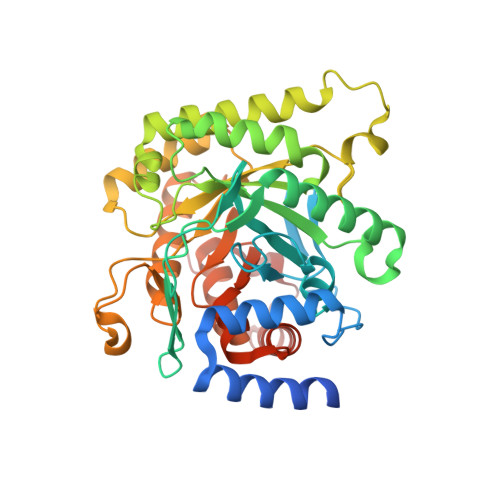Lead Optimization of a Pyrrole-Based Dihydroorotate Dehydrogenase Inhibitor Series for the Treatment of Malaria.
Kokkonda, S., Deng, X., White, K.L., El Mazouni, F., White, J., Shackleford, D.M., Katneni, K., Chiu, F.C.K., Barker, H., McLaren, J., Crighton, E., Chen, G., Angulo-Barturen, I., Jimenez-Diaz, M.B., Ferrer, S., Huertas-Valentin, L., Martinez-Martinez, M.S., Lafuente-Monasterio, M.J., Chittimalla, R., Shahi, S.P., Wittlin, S., Waterson, D., Burrows, J.N., Matthews, D., Tomchick, D., Rathod, P.K., Palmer, M.J., Charman, S.A., Phillips, M.A.(2020) J Med Chem 63: 4929-4956
- PubMed: 32248693
- DOI: https://doi.org/10.1021/acs.jmedchem.0c00311
- Primary Citation of Related Structures:
6VTN, 6VTY - PubMed Abstract:
Malaria puts at risk nearly half the world's population and causes high mortality in sub-Saharan Africa, while drug resistance threatens current therapies. The pyrimidine biosynthetic enzyme dihydroorotate dehydrogenase (DHODH) is a validated target for malaria treatment based on our finding that triazolopyrimidine DSM265 ( 1 ) showed efficacy in clinical studies. Herein, we describe optimization of a pyrrole-based series identified using a target-based DHODH screen. Compounds with nanomolar potency versus Plasmodium DHODH and Plasmodium parasites were identified with good pharmacological properties. X-ray studies showed that the pyrroles bind an alternative enzyme conformation from 1 leading to improved species selectivity versus mammalian enzymes and equivalent activity on Plasmodium falciparum and Plasmodium vivax DHODH. The best lead DSM502 ( 37 ) showed in vivo efficacy at similar levels of blood exposure to 1 , although metabolic stability was reduced. Overall, the pyrrole-based DHODH inhibitors provide an attractive alternative scaffold for the development of new antimalarial compounds.
Organizational Affiliation:
Departments of Chemistry and Global Health, University of Washington, Seattle, Washington 98195, United States.
















